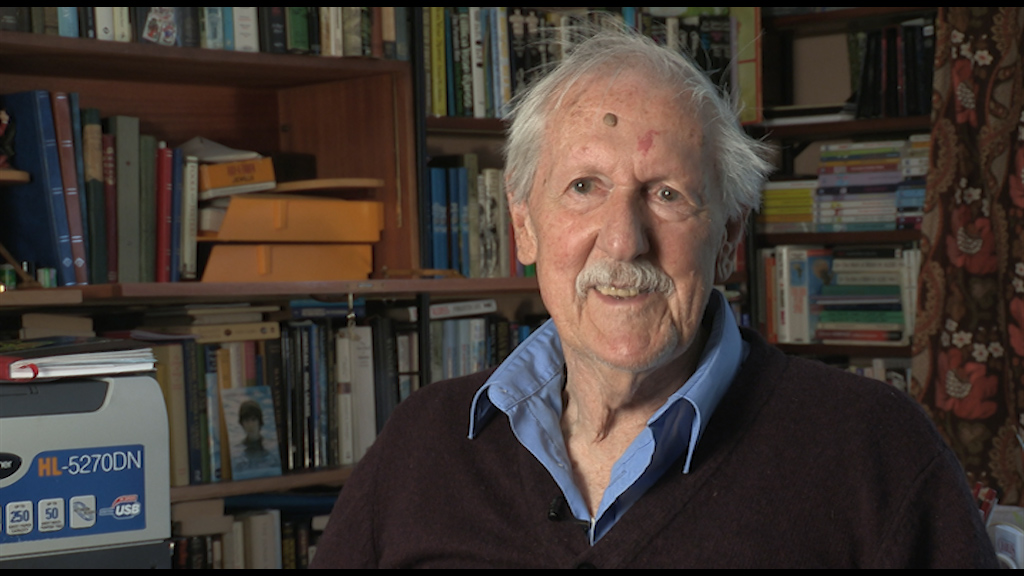NEXT STORY

Farewell to India
RELATED STORIES

NEXT STORY

Farewell to India
RELATED STORIES


|
Views | Duration | |
|---|---|---|---|
| 21. Breakfast on the move | 39 | 02:06 | |
| 22. The doorway of Burma | 45 | 02:34 | |
| 23. The Royal Signals' lot in Burma | 54 | 03:22 | |
| 24. Encountering the wildlife of Burma | 43 | 04:27 | |
| 25. Elements of culture in the midst of war | 44 | 03:37 | |
| 26. The beginning of the end of the war | 53 | 02:39 | |
| 27. A dreary homecoming | 44 | 02:14 | |
| 28. The most terrifying day of my life | 100 | 04:50 | |
| 29. The biggest tree in the world | 1 | 52 | 05:02 |
| 30. Farewell to India | 1 | 59 | 03:23 |


[Q] Did you have to do any killing?
I always hoped that I would kill a Jap. Whether I did or not, when our Signal Office on Wheels was attacked, I don't know – I certainly tried to. Once we got to India, I think, the Lee Enfield's were taken away from us, and we were given Sten guns – much better at killing Japs or Indians or anyone else that annoyed us.
And what happened there in India? Well, I dread to think...
Well, one thing that happened was... I was more or less on leave. I suppose I was given leave probably, but this didn't mean much at all. I took a trip in a ferry boat across the River Hooghly, to the Calcutta Botanical Gardens, and there it was that I saw something billed as the biggest tree in the world. And it was big – not as a sequoia is big, that goes up that way – it was big because it kept growing, rather lowly, not much taller than a man, but spreading outward all the time. And it was very carefully looked after, so that goats couldn't come and eat it as they did with many banyans. And many of the branches were painted white, to keep off insects, and so this was a very fine sight to see. You could walk round this... the biggest tree in the world.
And of course, there came to me this idea: what happens when it covers the world? Because, at the rate it was growing, it seemed a distinct possibility.
So, when I finally, finally got back to England, I looked up this banyan tree and found there was an article in... possibly the Cornhill [Magazine]... by Aldous Huxley's brother, Julian Huxley, about the banyan. Yes, very interesting. It was encased within a discussion about life and death, I think, and how some things, with care, could live forever like the banyan tree. And so, I was very pleased to see that it had a kind of an authentication by Julian Huxley.
And I suppose it must have been shortly after that that I wrote a short story, called Hothouse, which I sold to the Americans. And it was very popular, and so the editors said to me, 'Brian, this was so popular... couldn't you continue the story?' And so, I continued it and it became more and more popular, and I continued it more and more, and so that eventually I was forced around the dark side of the planet. And all those stories were a great success particularly, I think, in America where on the whole, they're more indulgent to science fiction than the British ever were, despite Mr HG Wells.
And so, I made them all into a coherent novel, and that sold very well and still sells well, and I believe now it's a Penguin Modern Classic. So, that's how long after that... well, half a century at least. Funny how things turn out.
Brian Aldiss (1925-2017) was an English writer and anthologies editor, best known for his science fiction novels and short stories. He was educated at Framlingham College, Suffolk, and West Buckland School, Devon, and served in the Royal Signals between 1943-1947. After leaving the army, Aldiss worked as a bookseller in Oxford, an experience which provided the setting for his first book, 'The Brightfount Diaries' (1955). His first science fiction novel, 'Non-Stop', was published in 1958 while he was working as literary editor of the 'Oxford Mail'. His many prize-winning science fiction titles include 'Hothouse' (1962), which won the Hugo Award, 'The Saliva Tree' (1966), which was awarded the Nebula, and 'Helliconia Spring' (1982), which won both the British Science Fiction Association Award and the John W Campbell Memorial Award. Several of his books have been adapted for the cinema. His story, 'Supertoys Last All Summer Long', was adapted and released as the film 'AI' in 2001. His book 'Jocasta' (2005), is a reworking of Sophocles' classic Theban plays, 'Oedipus Rex' and 'Antigone'.
Title: The biggest tree in the world
Listeners: Christopher Sykes
Christopher Sykes is an independent documentary producer who has made a number of films about science and scientists for BBC TV, Channel Four, and PBS.
Tags: Calcutta Botanical Gardens, Hothouse, Penguin Modern Classic, Julian Huxley
Duration: 5 minutes, 2 seconds
Date story recorded: September 2014
Date story went live: 17 August 2015